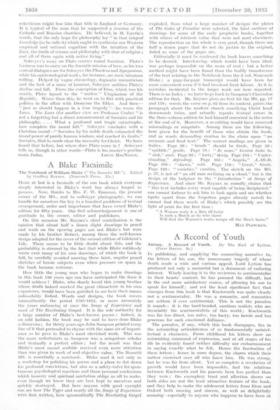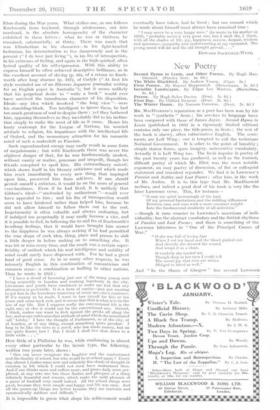A Record of Youth
Antony. A Record of Youth. By The Earl of Lytton. (Peter Davies. 9s.) Ix publishing, and supplying the connecting narrative to, the letters of his sore the unnecessary tragedy of whose death made a wide and various appeal, Lord Lytton has produced not only a memorial but a document of enduring interest. Wisely leaving it to the reviewers to sentimentalise to their hearts' content, he has pursued the difficult, but in the end more satisfactory course, of allowing his son to speak for himself ; and not the least significant fact that emerges from this book is'that Knchworth was quite clearly not a sentimentalist. He was a romantic, and romantics arc seldom if ever sentimental. This is not the paradox it sounds,: it is the hard-headed, cautious realists who are invariably the sentimentalists of this world ; Knebworth was far too direct, too naïve, too hasty, too heroic and too generous for such emotional dalliance.
The paradox, if any, which this book disengages, lies in the astounding articulateness of so fundamentally unintcl- lectual a character. From childhood his letters show an astonishing command of expression, and at all stages of his life he evidently found neither difficulty nor embarrassment in saying exactly what he felt. Hence the fascination of these letters ; hence in some degree, the charm which their author exercised over all who knew him. He was strong, but he was far from silent. Yet so complete a revelation of growth would have been impossible, had the relations between Knebworth and his parents been less perfect than they were ; the exemplary trust and affection shown on both sides are not the least attractive feature of the book, and they help to make the adolescent letters from Eton and Oxford both moving and sincere, as well as delightfully amusing—especially to anyone who happens to have been at Eton during the War years. What strikes one, as one follows Knebworth from boyhood, through adolescence, out into manhood, is the absolute homogeneity of the character exhibited in these letters : what he was at thirteen, he remained, substantially, at thirty. There was much that was Elizabethan in his character—in his light-hearted hedonism, his determination to live dangerously and in the present (" I do love just living "), in his fits of introspection, in his extremes of feeling, and again in the high-spirited, often lyrical quality of his self-expression. With this ability to express himself he often achieved descriptive brilliance, as in the excellent account of ski-ing (p. 68), of a return to Kneb-
worth after long absence (p. 187), of Carlyle (" At first his style reminded me of an illiterate Japanese journalist writing
for an English paper in Australia ") ; but it seems unlikely that his perpetual desire to write a book " would ever have survived the tumultuous character of his disposition.
Ideals—any idea which involved " the long view "—were his stumbling-block. Too intelligent to ignore them, he had too much greatness of soul to despise them ; yet they bothered him, opposing themselves as they inevitably did to his inclina- tion simply to make the most of life as it came. Hence his hasty contempt for the League of Nations, his worried attitude to religion, his impatience with the intellectual life of Oxford, and the momentary attraction for his romantic mind of such a makeshift as Fascism.
Such superabundant energy may easily result in some form
of megalomania ; but with Knebworth there was never the slightest danger of that, for he was fundamentally modest, without vanity or malice, generous and unspoilt, though his friends conspired to spoil him. His extraordinary naivettf, which shows itself in his literary criticisms and which made him react immediately to every new thing that impinged upon him, preserved him from self-love. If one should
permit oneself a criticism, it would be on the score of general over-hastiness. Even if he had lived, it is unlikely that Gibbon's ideal—" unclouded by enthusiasm "—would ever have appealed to him ; and his fits of introspection would seem to have hindered rather than helped him, because he did not allow himself to follow them out to the end.
Impetuousity is often valuable and always endearing, but if indulged too perpetually it may easily become a vice, and
it is possible to feel, in following the to and fro of Knebworth's headlong feelings, that it would have brought him sooner
to the happiness he was always seeking if he had permitted the true shape of each idea, thing, place and person to sink a little deeper in before rushing on to something else. It was hit or miss every time; and the result was a certain super- ficiality of outlook which his real intelligence and nobility of
mind could surely have dispensed with. For he had a great fund of good sense. As in so many other respects, he was
intensely English in this combination of romanticism and common sense—a combination so baffling to other nations.
Thus he wrote in 1925 :
" I have a dread of becoming just one of the many young men living miserably in London and working hopelessly in the city. Literature and youth have combined to make me feel that any alternative is preferable. It is a form of vanity—just not wanting to got lost in the humdrum monotony of every one else's existence. if it's money to be made, I want to lose myself for five or ten years. and come back rich, and it seems that that is what is to be the aim of my life. But I suppose really the conventional life is the right ono, or else it would not be the conventional one. Oxford,
I think, makes one want to kick against the pricks all along the 'line, and so one cultivates that attitude of mind which the uninitiated call bolshy.' I hate the thought of Parliament, or of the city, ol- d London, or of any thing,• except something quite peculiar.' I long to be like the hero in a novel, who has made money, but no one quite knows how 1 But I think I shall live that down in a little while . . "
How little of a Philistine he was, while conforming in almost every other particular to the heroic type, the following, written two years later, shows :
" One can never recapture the laughter and the contentment and the finality of school, but who would bo at school again ? Every day almost I realise seine now and infinitely fine shade of thought or emotion, in life which I could not even have understood then. And if one thinks more and suffers more, and grows daily more per- plexed, at any rate one has those flashes and glimpses of a thing infinitely 'beautiful and remote, which make the mild pleasure of a game of football very small indeed. All the 8(41601 things were good, because they wore simple and happy and life was easy. And all the grown-up things are bettor because they are intricate and spasmodically sublime and difficult."
It is impossible to guess what shape his achievement would eventually have taken, had lie lived ; but one remark which he made about himself must always have remained true :
" I may never be a very happy man," (he wrote to his mother in 1928), "probably never a very great one, but I shall die, I think, with all the shades of life, joy, happiness, sorrow, despair, wisdom and ignorance, sympathy and understanding at my command, The young mood will die and the old thought prevail.. .."
EDWARD SACKVILLE-WEST.











































 Previous page
Previous page